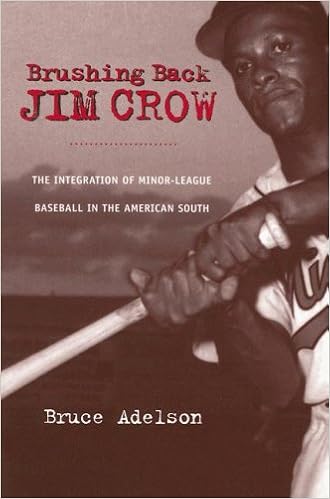Jackie Robinson's heroic turn as the first African American major league baseball player receives lots of attention--and for good reason, as this brings out. But few think about all the other players who helped integrate professional baseball, and here I don't mean major league ball. Adelson, in this book, turns his attention to the minor leagues, particularly those in the South, which lagged behind the majors and which featured many of the same struggles that were endured by men like Robinson.
The book begins with an anecdote about a young man whose intention was to continue on to college but who was drafted by a baseball team. He didn't really want to play, but his dad urged him to, because that had been the father's dream. For most African Americans, until the 1950s, playing baseball professionally was just that--a dream--unless of course one played for the Negro Leagues. This was an opportunity, the dad brought out, to do something great for a people. The son chose baseball. The anecdote, as written, held for me an emotional wallop.
Alas, in one of the major issues for this book, the anecdote is repeated in the very next chapter, word for word (though in slightly greater detail insofar as it is enlongated at its start and end). Other anecdotes and quotes are repeated elsewhere in the book. And there is no index, so tracking down a minor character's identity is difficult; described first in some early chapter, the character is not reintroduced in a late chapter where he shows up again, and so one is left with a gnawing wish to remember who this guy is or was.
But the tales themselves are incredibly interesting. Adelson spends time in different leagues during the course of the 1950s, covering events year by year, and connecting them to large events in the civil rights movement. Often, rather than writing about the events, he lets quotes from newspapers or from interviews with baseball stars stand in for narrative, giving one a sense of the times.
In brief, some of the rather amazing things that happened included the following: A given minor league team might integrate by adding one or two black players. That team then reaped the benefits of larger attendance from black patrons, at a time when attendance numbers were otherwise sagging. But other teams in a league often disagreed with such actions, and so various things might happen to stop the integration from fully occurring. State and local governments might ban interracial game and sporting events, or the league leadership itself might step in to enforce segregation. As a result, black players from another team had to be left behind or the team might have to forfeit (ironically to the team that refused to play because of the inclusion of a black player). Just as segregated buses were boycotted in some cities during the civil rights movement, so too African Americans often ended up boycotting games by those teams that refused to integrate, which increased the attendance problem and the declining revenue. In some cases, leagues or teams ended up going out of business because of their stubborness. Some northern teams simply stopped coming South to play sports (most notably, in college football, but also exhibition baseball games with major league teams).
But even if a black player was allowed to take the field, there were other issues. There wasn't just the name calling, which often spurred such athletes on. There was the fact that seating was often segregated so that African Americans were relegated to lousy outfield seats and often not enough--this last factor sometimes led to expanded black and eventually integrated seating. There was the fact that black players might take the field with their white counterparts, but after the game, they'd have to go stay at someone's house. They couldn't go to the hotel with the team, couldn't eat at the same restaurants as the team, couldn't essentially do anything with the team itself out in public. It was a lonely and tough life, a mirror of what Robinson endured but sometimes in spades insofar as this was the South, where jim crow reigned.
I never thought much, when I was younger, about what some players had endured just a decade or so before my birth, men like Billy Williams or Hank Aaron, who played minor league ball in the South and who were old and about-to-retire stars or new coaches when I was a kid. I thought of them as great ballplayers, but their early careers were in fact civil rights-type actions, given the prejudice they had to endure. As Adelson shows, baseball was in some ways the first line of integration. As segregation fell here, it would fall elsewhere in entertainment, at schools, and in public transportation.
Thursday, August 16, 2018
On "Brushing Back Jim Crow" by Bruce Adelson ***
Labels:
Books,
Bruce Adelson,
Nonfiction,
Three-Star Nonfiction
Subscribe to:
Post Comments (Atom)







No comments:
Post a Comment